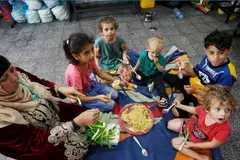Over 54,000 Gaza children acutely malnourished as Israel and Hamas agree to ceasefire
Key takeaways
- Over 54,600 Gaza children are acutely malnourished, with rates rising during aid blockades and falling during ceasefires.
- A Trump-brokered ceasefire between Israel and Hamas marks the first phase of a peace plan to restore aid access and release hostages.
- UN data links child wasting trends to restricted humanitarian aid, warning that continued conflict could lead to irreversible famine and higher child mortality.
Israel and Hamas have agreed to a ceasefire in Gaza and the release of hostages. This is the first phase of US President Donald Trump’s “20-Point Peace Plan.” This news comes as a new publication in The Lancet finds that over 54,600 children in Gaza are acutely malnourished and have few therapeutic options available.
Conducted by the UN Relief and Works Agency and partners, the study reveals that during a six-week ceasefire earlier this year leading to more aid entering the Gaza Strip, by March, wasting fell 5.5%, or 831 out of 15,165 children. However, this was followed by an 11-week blockade until May.
It flags that peaks of acute malnutrition match the period of severe aid restrictions between January 2024 and August 2025. Wasting or acute malnutrition is life-threatening and requires regular therapeutic food treatment.

Meanwhile, nonprofit Heal Palestine is expanding its bakery operations in southern Gaza as the need for basic nutrition grows daily. Last month, it delivered 12,419 cans of milk formula to hospitals, clinics, and families in displacement camps across Khan Younis.
“Since October 7, 2023, an unprecedented war has unfolded across the Gaza Strip. From the outset, the territory’s infrastructure has been destroyed, the population repeatedly displaced, and with few exceptions, humanitarian aid has been severely restricted,” comments Dr. Akihiro Seita, the UNRWA Director of Health and a senior author of the paper.
“Given the long failure to stop the war and prevent encroaching famine despite a global capacity to do so, unless there is a lasting cessation of the conflict coupled with unimpeded, competent, international humanitarian nutritional, medical, economic, and social services, a further deterioration in early childhood nutrition with increased mortality is inevitable in the Gaza Strip.”
Malnutrition rise amid blockades
The UNRWA for Palestine Refugees in the Near East screened 219,783 children aged 6-59 months and measured their mid-upper arm circumference (MUAC) at health centers, medical points, shelters, and tented encampments in the Gaza Strip.
“Evidence prior to October 2023 indicated that children in Palestinian refugee families in the Gaza Strip were food insecure and had poor dietary diversity. Yet, they were only marginally underweight,” says study lead scientist Dr. Masako Horino, nutrition epidemiologist at UNRWA.
“This paradox was likely explained by these families’ regular access to food aid. Following two years of war and severe restrictions in humanitarian aid, tens of thousands of preschool-aged children in the Gaza Strip are now suffering from preventable acute malnutrition and face an increased risk of mortality.”
On August 15, 2025, the UN Integrated Food Security Phase Classification confirmed famine in Gaza City. The rest of the Strip faced severe famine conditions and bans on fishing, limiting local production, with no options to grow, harvest, or hunt their food.
The most extreme finding, for instance, in Rafah, was that wasting malnutrition increased from 7.1% in April 2024 to 31.5% in January 2025. In association with the ceasefire, it decreased to 8% in April 2025. However, MUAC screening stopped in this area shortly after.
In Gaza City, malnutrition showed a six-fold increase from 5.4% in March 2025 to 28.8% in mid-August 2025.
Announcements
Israel’s war on Gaza escalated when Hamas killed around 1,200 Israeli people and took 251 hostages two years ago on October 7, 2023.
Reportedly, Hamas recently said on Telegram: “That an agreement has been reached providing for an end to the war on Gaza, the withdrawal of the occupiers, the entry of humanitarian aid, and a prisoner exchange.”
“We greatly appreciate the efforts of our mediator brothers in Qatar, Egypt, and Türkiye. We also commend the efforts of US President Donald Trump, which aim for a final end to the war and the complete withdrawal of the occupying Israeli forces from the Gaza Strip.”
On Truth Social, Trump states: “All of the hostages will be released very soon, and Israel will withdraw their Troops to an agreed-upon line as the first steps.”
Meanwhile, the European Council on Foreign Relations warns that Trump’s Peace Plan risks “entrenching a fragmented, externally managed and ultimately unsuccessful peace process,” as it lacks clear, enforceable guarantees, especially surrounding when and how Israel will withdraw.
They add that the plan “gives guarded support for Palestinian self-determination.” At the same time, the “Board of Peace” — chaired by Trump and former UK prime minister Tony Blair — would be set up as a “de facto government” with power over Gaza’s “humanitarian, economic, legislative, security and reconstruction issues.”
Gaza in headlines
According to the Palestinian Ministry of Health, Israel has killed 67,173 people since the start of the war until this month, October 7.
A recent paper offered solutions for how Gaza can overcome its malnutrition crisis, including psychosocial support, localized food systems, community-based nutrition education, and women’s empowerment. It stressed that recovery should be more than returning to normalcy before the war. It should build resilient, locally grounded, and community-led food systems.
In August, José Andrés, the founder of World Central Kitchen, visited Gaza and Israel to expand the organization’s daily food aid operations. Meanwhile, Amnesty International critiqued the “deliberate starvation” policies in the region, and the WHO director-general calls out “man-made” mass starvation.
In April, the UN World Food Programme warned of a catastrophic hunger crisis as food stocks ran out with soaring prices. The agency delivered food and supplements in Gaza after the Israel-Hamas ceasefire agreement in January. In November last year, the UN called for action to prevent famine risk in northern Gaza.


















